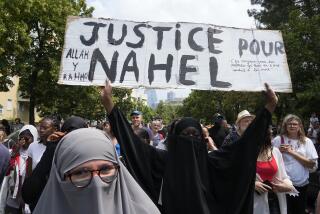French soccer officials in racism controversy
- Share via
Reporting from Paris — They were once hailed as a potent symbol of France’s ethnic melting pot; the French soccer team, known as Les Bleus but nicknamed the “black-blanc-beur” (black-white-Arab) squad.
Today, French soccer officials stand accused of hatching a secret plan to limit the number of nonwhite players in line to eventually make the national squad.
A secret recording has members of the country’s soccer federation discussing capping the number of 12- and 13-year-old black and Arab hopefuls at sports academies to 30%.
Quotagate, as it is being called, emerged on the investigative website Mediapart last week, sparking controversy and official inquiries. The French Football Federation quickly suspended a top-level official. An investigation was also launched by the French government, which does not allow quotas based on race or ethnicity.
Sports Minister Chantal Jouanno said the aim was to find out whether any crime had been committed. “We are looking to see if any law has been broken. This is not a witch hunt,” she said on French radio.
In the covert recording, made at a meeting in November, the suspended official Francois Blaquard, responsible for youth coaching policy, is heard saying: “We could organize, on a non-spoken basis, a sort of quota. But it must not be said.”
Laurent Blanc, the national team manager, is heard saying he broadly agreed with limiting the number of nonwhite players who then “go on to play for North African or African teams.” He backed a change of selection criteria to favor “boys ... with our own culture.”
As an example, he is heard citing the Spanish national team: “The Spanish, they told me, ‘We don’t have a problem. Blacks? We don’t have any.’”
After the recording became public April 29, Blanc, a former player, denied any knowledge of the quota proposal. When Mediapart published the transcript of the recordings two days later, he issued a qualified apology.
“I admit some remarks made during a work meeting, taken out of their context, may be misinterpreted. As far as I am concerned, I apologize if I have hurt some feelings. But I, who am against any form of discrimination, do not accept being accused of racism or xenophobia,” he said in a statement.
He added that the point of the controversial meeting had been to “discuss the future of French football and deal with the delicate problem of players with dual nationality.”
On Tuesday, Mohammed Belkacemi, one of the federation’s technical advisors, acknowledged that he had made the secret recording, though he denied leaking it. He said he found the proposal to limit the number of young players in training programs based on ethnicity “unacceptable.”
In 1998 when the French team won the World Cup, Les Bleus were widely celebrated as an exemplar of modern, multicultural France. A majority of the 23 players on the squad led by Zinedine Zidane, the son of Algerian immigrants, were of non-French origin.
Afterward, far-right National Front leader Jean-Marie Le Pen complained that there were too many blacks on the team, and a Socialist Party regional official was expelled for making similar comments.
In 2005, the high-profile French philosopher Alain Finkielkraut caused a firestorm when he told the Israeli newspaper Haaretz that “the French national team is in fact black-black-black.”
Last week Lilian Thuram, from the French overseas territory of Guadeloupe in the Caribbean, who was on the 1998 squad, said on French television: “When are we going to get away from these prejudices about the color of someone’s skin? When are we going to stop saying when you’re black, you run faster, when you are black, you are less intelligent?”
Willsher is a special correspondent.
More to Read
Sign up for Essential California
The most important California stories and recommendations in your inbox every morning.
You may occasionally receive promotional content from the Los Angeles Times.










